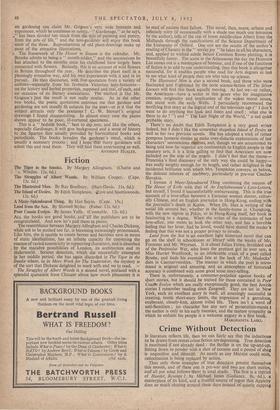Fiction
The Struggles of Albert Woods. By William Cooper. (Cape.
12s. 6d.) ' A Many-Splendoured Thing. By Han Suyin. (Cape. 15s.) Land from the Sea. By Showell Styles. (Faber. 12s. 6d.) Poor Cousin Evelyn. By James Yaffe. (Constable. 12s. 6d.) ALL the books are good books, and all the publishers are to be congratulated. And now let's pull them to pieces.
The resemblance between Margery Allingham and Charles Dickens, while nett to be pushed too far, is becoming increasingly pronounced. Like him, she is unable to create heroes and heroines save in terms of static idealisations, has an infinite capacity for conveying the essence of varied eccentricity in supporting characters, and is absorbed by the macabre possibilities of London, its architecture and its Underworld. Serious detection, which she successfully attempted in her middle period, she has again discarded in The Tiger in the Smoke where, as in More Work for The Undertaker, the mystery is of the sort that Dickens delighted to work with and we to read.
The Struggles of Albert Woods is a second novel, prefaced with a splendid quotation from Chaucer about how much pleasanter it is to read of success than failure. This novel, then, suave, urbane and infinitely witty (if occasionally with a shade too much coy intrusion by the author), tells of the rise of lower middle-class Albert from the Midlands through the ramifications of the Science Department of the University of Oxford. One can see the results of the author's reading of Chaucer in the " verray joy " he takes in all his characters, and, applied to wicked subtle Senior Common Room plotting, it is beautifully funny. The scene in the Athenaeum the day the Honours List comes out is a masterpiece of humour, and if one of the functions of fiction is to add to our understanding, then this book is altogether successful, for it enables people who read for Arts degrees at' last to see what kind of people they are who take up science.
The Illustrated Man is also a second book, and those who were fascinated and frightened by the eerie science-fiction of The Silver Locusts will find this book equally moving. At last we—or rather, the Americans—have a writer in this genre who for imaginative creation, originality and implication of the widest moral issues, can stand with the early Wells. I particularly recommend the terrifying first story as the logical end of the television age (" I don't want to do anything but look and listen and smell ; what else is there to do ? ") and " The Last Night of the World," a sad quiet probable story.
There's no doubt that Edith Templeton is a very good writer indeed, but I didn't like the somewhat shapeless Island of Desire as well as her two previous novels. She has adopted a trick of rather pompous homeric similes to make over-didactic explanations of her characters' unconscious motives, and, though we are accustomed to being told how far superior are continentals to English people in the amatory arts, it is a little galling to find that Americans are now included on the side of the angels. 1 didn't feel that the theme- Franciska 's final discovery of the only way she could be happy— was really weighty enough for its length, and rather delighted in the incidental brilliance with which Mrs. Templeton conveys, as before, the delicate nuances of snobbery, particularly in pre-war Czecho- Slovakia.
I foresee A Many-Splendoured Thing combining the success of The House of Exile with that of An Englishwoman's Lave-Letters, but myself, 1 found it uncomfortably embarrassing. This is the true account of a love-affair between a Eurasian woman doctor, cultur- ally Chinese, and an English journalist in Hong-Kong, ending with the journalist's death in Korea. When Dr. Han is writing of the social life around her, whether in the family-home in Chungking, with the new regime in Pekin, or in Hong-Kong itself, her book is fascinating to a degree. When she writes of the intimacies of her love-affair, one wants to look the other way, and has a horrible feeling that her lover, had he loved, would have shared the reader's feeling that this was not a proper privacy to invade. Land from the Sea is an excellent light historical' novel that can go on the shelf in schoolroom or librar9' with the works of Mr. Forrester and Mr. Weyman. It is about Julian Fettes, invalided out of the Peninsular War, who loses the prettiest girl he ever saw, a Miss Harriet Westbrook, to an intolerable crank of a poet called Bysshe, and finds his eventual fate at the back of Mr. Madocks' dam in Caemarvonshire. The manner in which the poet is intro- duced is original and amusing, and an atmosphere of historical accuracy is combined with some good tense story-telling.
There is, unfortunately, a consumer-prejudice against books of short stories, but it should be waived for those contained in Poor Cousin Evelyn which are really exceptionally good, the best Jewish stories I remember reading since Zangwell. They are set in New York, each an excellent story in itself. all amazingly successful in creating, inside short-story limits, the impression of a garrulous, exuberant, closely-knit, almost tribal life. There isn't a word of anti-Semitism ; no character has any sort of persecution-mania the author is only in his early twenties, and the mature sympathy in which he enfolds his people is a welcome augury in a first book.
MARGHANITA LASKI.


























































 Previous page
Previous page